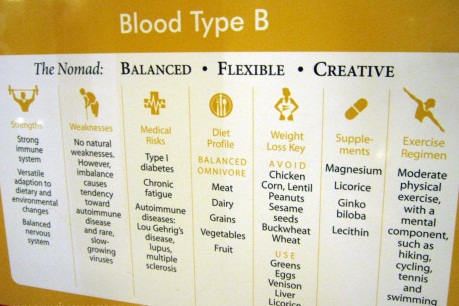



Consuming a diet that is suited to your blood type is a concept popularized by Peter J. D'Adamo, N.D., a naturopathic physician who wrote the bestselling book "Eat Right 4 Your Type". According to him, if you have a B-blood type, you should eat foods different from people with other blood types (A, O, or AB) because certain proteins called lectins from foods react with your blood. Be careful, though, when choosing a blood type B diet because there is little scientific data to support such claims.
According to Dr. D'Adamo, people who have type B blood carry certain genetic potential for being flexible and able to change with varying conditions. You are able to move in either direction of the continuum, but you can be highly sensitive to factors that can make you slip out of balance. Challenges to optimum health include a higher sensitivity to lectins (a type of protein) in certain foods, tendency to produce higher levels of stress hormones, proneness to slow growth, and susceptibility to autoimmune diseases.
The primary challenges that can get in the way of optimum health for type B include a tendency to produce cortisol levels higher than normal in situations to stress, sensitivity to the B-specific lectins in certain foods, and proneness to lingering viruses. However, Dr. D'Adamo explains that a healthy blood type B individual has fewer risk factors for disease and tends to be more physically fit and mentally balanced than people of other blood types.
He, therefore, advice people to eat right for your blood type B, which will be suitable to their following characteristics:
To maintain health, it is recommended that you eat right for your blood type B. Here are some blood type B diet recommendations:
|
Type of Food |
Food to Eat |
Food to Avoid |
|
Meat |
Beef, lamb, mutton, ostrich, pheasant , game |
Pork, chicken, duck, goose, guineau fowl, and quail |
|
Fish |
Cod, halibut, mackerel, plaice, salmon, sturgeon, and sole |
Anchovy, bream, octopus, pollock, eel, salmon roe, crab, lobster, clams, mollusks and prawns |
|
Dairy products |
Cow's milk , goat's milk and cheese, mozzarella, feta, fromage frais, and yogurt |
Blue cheese |
|
Eggs |
Hen's eggs |
|
|
Oil |
Flax seed, olive, walnut, and wheat germ oil |
All others |
|
Nuts and seeds |
Almonds, chestnuts, Brazil nuts, flax seed, pecans, walnuts, macadamia nuts |
Cashew nuts, peanuts, hazelnuts, pine nuts, pistachios, poppy, sesame seeds |
|
Pulses/legumes |
Black beans, lentils, soya, chickpeas |
|
|
Cereals |
Wheat (semolina/ white flour based products), millet, oats, quinoa, spelt, rice |
Buckwheat, corn, whole wheat,tapioca, rye |
|
Vegetables |
Most vegetables |
Artichokes, sweet corn, olives, pumpkin, radishes, tomatoes, rhubarb |
|
Fruit |
Most fruits |
Avocados, persimmon, pomegranate, coconut, Indian figs and star fruit |
Other recommendations for blood type B diet include eating foods from natural or organic sources. Eat good carbs such as whole grains, but avoid wheat rye, and corn. Make sure to get enough protein, but avoid chicken. Eat healthy fats, but limit your intake of saturated fat and trans fat.
Choose fiber-rich foods such as whole grains, fruits and vegetables. Choose dark green, orange, red, and yellow vegetables and fruits. Drink water and avoid sugary drinks. You can take one to two cups of 100% fruit juice but only if prepared fresh. Limit salt intake by eating fewer processed foods.
Get calcium from sardines, spinach, kelp, celery, broccoli, and figs. Take a daily multivitamin containing vitamin C, magnesium and calcium. Take a daily probiotic supplement to restore balance and boost immune function. As you will notice, following a healthy, balanced diet ensures you eat right for your blood type B.
Aside from a blood type B diet, you can also maintain your well-being and avoid disease by living a healthy lifestyle. This should consist of getting enough exercise and practicing healthy habits.
For type B individuals, Dr. D'Adamo recommends choosing physical exercise that challenges both the body and the mind. You need to balance intense physical exercise with meditative activities. These may include tennis, cycling, hiking, golf, and martial arts.
Healthy lifestyle habits for blood type Bs include visualization and finding healthy ways to express yourself. Get enough rest and sleep and use meditation to relax. You are a natural networker, so try to engage in community or group activities. Although type Bs are prone to suffer from reduced mental acuity and memory loss, you can stay sharp by engaging yourself in tasks that require attention, such as doing crossword puzzles or learning a new skill.